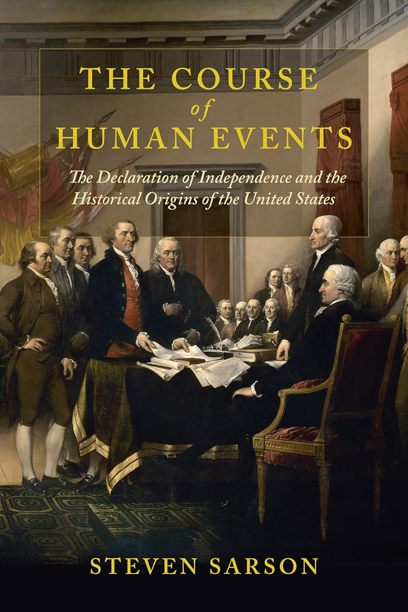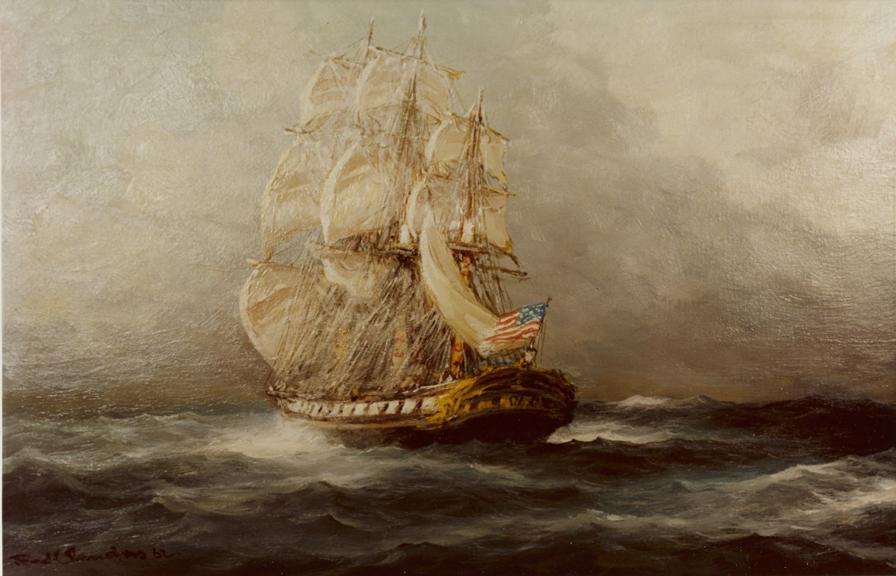Small Boats and Daring Men: Maritime Raiding, Irregular Warfare, and the Early American Navy by Benjamin Armstrong (University of Oklahoma Press, 2019)
In the seventy-foot sloop of war Providence, John Paul Jones began his illustrious military career in 1776 with a series of littoral raids in Canadian waters. The bold commander, sailing with a contingent of Continental Marines and soldiers of the Rhode Island Brigade, raided ports and shipping, scoring important victories early in the American Revolution and netting lucrative prizes for a young and cash-strapped United States. Thus begins the new book Small Boats and Daring Men by Benjamin Armstrong, a thorough and often exciting examination of the nascent United States Navy as it engaged in combat close along its shores and in shallow waters around the globe. With daring bravado and shrewd tactics, courageous American naval commanders helped establish the scope of irregular warfare that has come to define modern operations by such elite units as the Navy SEALs and Marine Raiders.
Armstrong, an assistant professor of War Studies and Naval History at the U.S. Naval Academy, delves deeply into the past to show that warfare aboard early American Navy vessels was not just broadsides and blue-water battles. He details these maritime combat experiences in the first sixty years of the country’s existence, including raiding parties, punitive actions and preemptive strikes. These actions take place around the globe—from England and the Caribbean Sea to Sumatra and the shores of Tripoli.
Of course, John Paul Jones graduated from that small sloop to bigger ships of war. His raid on Whitehaven, while tactically unimpressive, was a strategic victory because of its effect on British morale. Jones’s actions struck fear into the hearts of English subjects who now realized they were susceptible to American attacks at will. His continued raids in the sloop-of-war Ranger along the English, Irish, and Scottish coasts and plundering of British vessels showed the Royal Navy was not the protector the populace believed it to be. In summing up this series of engagements, Armstrong aptly quotes famed naval historian Samuel Eliot Morison, who wrote that “the damage done was inconsequential . . . but the moral effect was stupendous.”
Small Boats and Daring Men also probes the Quasi-War, the undeclared naval conflict between the United States and France following Napoleon’s ascent to power. While adequately describing the buildup to war and some of the major engagements, Armstrong focuses on the successes of two American vessels—the schooner Experiment and sloop Sally—in littoral attacks on French ships.
Sailing with several smaller vessels, the captain of the Experiment used stealth and cunning to defeat a much larger attack force of pirates in barges along the shores of Haiti. He raked the enemy with grapeshot and used small-arms fire by marines effectively to subdue his enemy. The Sally also used subterfuge to confuse its target, the former British packet ship Sandwich, which had been captured by French privateers and now was raiding American shipping. Anchored in Puerto Plato Harbor in Hispaniola, the Sandwich was caught unaware as the Sally sailed alongside and its crew swarmed over the bulwarks. U.S. Marines then went ashore and spiked the cannon of a fort held by the Spanish, allies of the French.
Armstrong also chronicles the battle that turned “to the shores of Tripoli” into a lyric recognized today by nearly every American—though most are unlikely to know where that Moroccan port is located. The First Barbary War triggered a blockade of the harbor, where the frigate Philadelphia ran aground on uncharted rocks. The ship was later refloated by the Tripolitans and her crew taken as prisoners. Negotiations for the release of the Americans and the Philadelphia dragged on for months. Finally, a sneak attack by the Intrepid, under the daring command of Lt. Stephen Decatur Jr., retook the frigate, which was then burned to the waterline. The crew would remain prisoners until the end of the First Barbary War in 1804 but the bold action ignited the American public and gave the Mediterranean Squadron the morale boost it needed to continue the fight.
With equal mastery, Armstrong covers the Great Lakes campaign and other inshore engagements of the War of 1812, the exploits of the West Indies Squadron in battling pirates and privateers in the Caribbean, and the two expeditions to Sumatra in the 1830s to punish native tribes for attacking U.S. ships. The level of detail is impressive as the author cites official sources and even letters and diaries of seamen to describe the large extent of raids, assaults and bombardments that characterized the early development of American sea power.
This is an engaging book that details the efforts of sailors and marines to defend their country against foreign aggression while making the case about how these first instances of coastal combat set the tone for what was to come. Armstrong provides a critical look at the importance of this style of naval warfare from a historic standpoint while arguing successfully of its continued importance today in the modern American navy.
Small Boats and Daring Men: Maritime Raiding, Irregular Warfare, and the Early American Navy is a compelling history by a talented author with a deep understanding of the tactics and strategies of maritime missions. It is also a great read with an exciting narrative of combat during the era of wooden ships and iron men.
PURCHASE THIS BOOK FROM AMAZON
(As an Amazon Associate, JAR earns from qualifying purchases. This helps toward providing our content free of charge.)









3 Comments
My husband’s ancestor was in the Massachusetts state navy at the outbreak of the Revolution. He was in Plymouth and provided protection to the Guarnet off of Plymoth. He ended up getting his ship scuttled during the Battle of Penobscot ( which is how I discovered this). I was surprised to find out about this navy.
Is there any mention of the first ‘officially recognized’ naval battle, the Battle of Machias?
Sounds like a fascinating read. Adding it to my list. I’ve read Morison’s 1959 Pulitzer Prize winning book, “John Paul Jones A Sailor’s Biography” and can’t recommend it highly enough. Thank you for this great review. I own quite a few books reviewed by JAR and have never been disappointed.